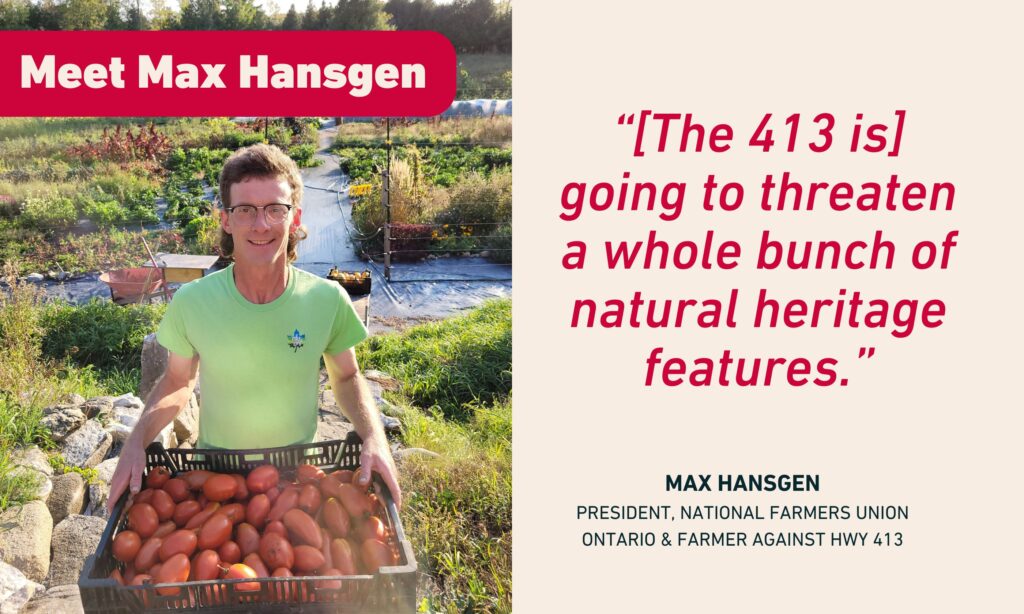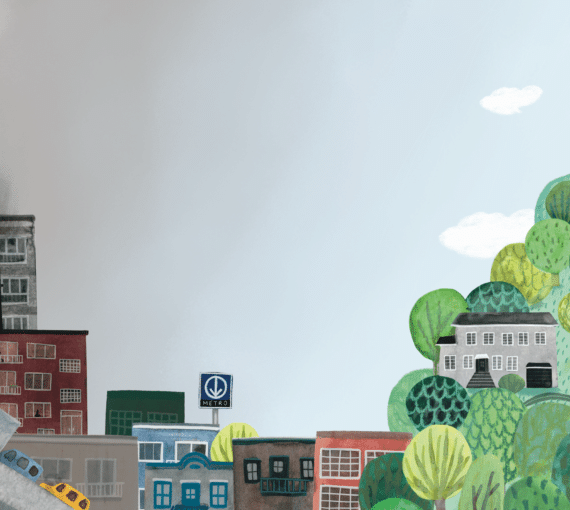
As president of the Ontario branch of the National Farmers Union (NFU), Max Hansgen lobbies government on behalf of family farms. The union is a vocal opponent of Highway 413.
Max Hansgen is one of the key figures in the struggle to halt development of Highway 413 in Ontario’s Greenbelt
Max Hansgen loves his job. He loves to be outside and to work with his hands, and in a world that can be isolating and lonely, he loves how farming brings together like-minded souls.
“[As] much as distance has fractured communities compared to traditional times,” he explains, “farmers still tend to form a community,” coming together for community events and “fighting for causes.”
Fighting for causes happens to be Hansgen’s other job. As president of the Ontario branch of the National Farmers Union (NFU), he lobbies government on behalf of family farms. The union is a vocal opponent of Highway 413, the Ontario government’s proposed 52-kilometre throughway that will pave forests and agricultural land around the outskirts of Toronto.
The province argues that the new highway would fight congestion in one of North America’s fastest-growing regions, but Hansgen and the NFU see it differently. They are concerned that the highway’s construction will destroy hundreds of acres of nature and farmland in the Greenbelt – two million acres of protected land in a region known as the Golden Horseshoe – and contribute to urban sprawl along its route.
“[The 413 is] going to threaten a whole bunch of natural heritage features,” Hansgen says. “We’re talking about loss of ecosystem diversity, loss of climate change mitigation, loss of protection to our waterways.”
And, according to Hansgen, it won’t make traffic any better, as the province claims; rather, it’s only going to make gridlock worse. “Every traffic study on highways verifies that when you build a highway, the cars are soon to follow. And that is exactly what’s going to happen here,” he says.
And, according to Hansgen, it won’t make traffic any better, as the province claims; rather, it’s only going to make gridlock worse. “Every traffic study on highways verifies that when you build a highway, the cars are soon to follow. And that is exactly what’s going to happen here,” he says.
Real solutions to the root problems
Hansgen was born in the eastern Ontario town of Lanark and, at age 14, got his first job picking and processing organic garlic. Back in the mid-1990s, the term “organic” wasn’t in common usage, and Hansgen says he “didn’t even understand what it meant.” That is, until he spent two summers apprenticing on a biodynamic farm that produced goat’s milk, eggs and pork.
Today he and his wife grow carrots, onions and about 4,000 heads of garlic on a small plot of pesticide-free land surrounded by wildlife, including sandhill cranes, trumpeter swans and, one time this summer, a bear.
Hansgen shares his passion for protecting the Greenbelt with thousands of other farmers who are members of the NFU, an organization that works for not only environmental protection but social justice. “We’ve supported other unions, other disadvantaged people, because lots of farmers feel like they work very hard for little profit,” he says. “We feel like we’re at the social margins already and so have sympathy for other people who are on the margins of society.”
Right now, a top priority is saving the Greenbelt, which is too precious to be sacrificed for another highway. It contains “some of the best-quality farmland in the world in one of the most forgiving climates in the world,” he says.
If the province were serious about tackling congestion, it would expand mass transit, make better use of current highways and increase densification within municipalities’ present boundaries. These solutions, Hansgen suggests, get at the problem’s root cause.
If the province were serious about tackling congestion, it would expand mass transit, make better use of current highways and increase densification within municipalities’ present boundaries. These solutions, Hansgen suggests, get at the problem’s root cause.
“If we took that money [allocated to the 413] and poured it into proper infrastructure for public transit, that would probably solve all of the domestic traffic issues right away,” he says. “[And] if we could bypass trucks along the 407 – which is a very underutilized highway except for peak times – it would get rid of most of the commercial traffic immediately.”
But will farmers’ recommendations find a receptive audience in Ontario’s legislature? Hansgen thinks they will.
“Agriculture is one of the biggest industries in Ontario, so we’re a huge financial block,” he says. “We tend to be employers. We tend to be fairly large spenders at local businesses . . . And since we’re spread out across the province and we’re well connected and well funded, I think that’s enough justification to say we should be listened to.”
This article was originally published in Corporate Knights.
Stand with Ontario farmers, sign the petition to STOP Highway 413!
Related Projects
Always grounded in sound evidence, the David Suzuki Foundation empowers people to take action in their communities on the environmental challenges we collectively face.



